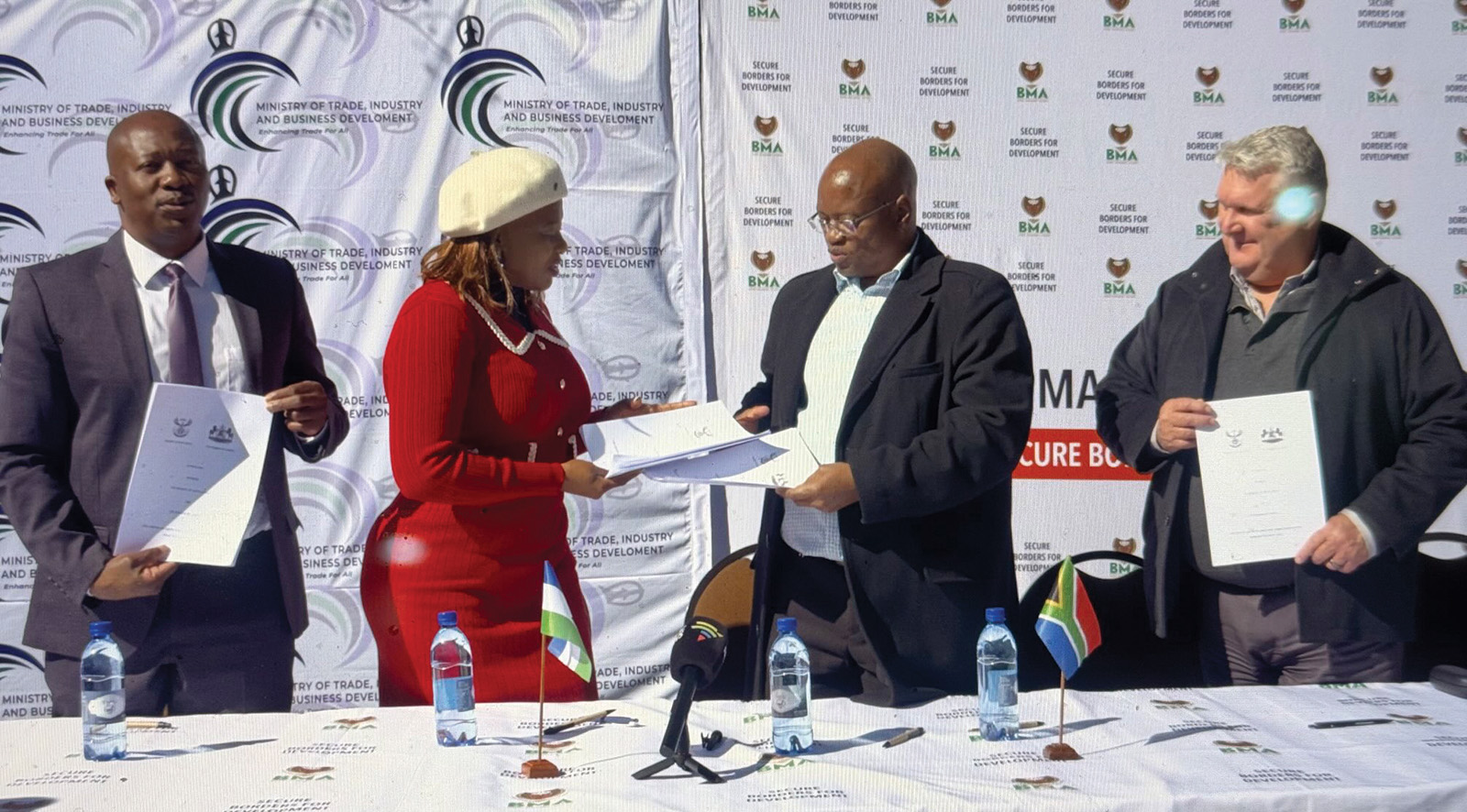Non-compliance with Ombudsman’s recommendations worrisome

SHARE THIS PAGE!
The Ombudsman, Advocate Tlotliso Polaki, says lack of understanding of the broad mandate of the office in strengthening governance and reduced financial support over the years hinders its efforts to promote good governance in the conduct of all state affairs and ensuring an effective and efficient organisation.
In this interview, with theReporter’s ‘Mantšali Phakoana, Advocate Polaki, bemoans that while her office has completed investigations into a lot of individual cases, these remain open due to non-compliance by some ministries which fail to take remedial action. She also talks about the office’s successes and obstacles.
What is the mandate of the Ombudsman?
The main function of the Ombudsman is to receive and investigate complaints from aggrieved persons against government agencies and statutory corporations and or officials, and employees of such organisations, with a mandate to recommend remedial action where justified.
The Ombudsman is what is often termed ‘a parliamentary watchdog’. The office is entrusted with the important responsibility of strengthening good governance in the public service by inculcating a culture of transparency, accountability, respect for the rule of law, and protection of fundamental human rights and freedoms.
Our broad mandate is to protect the public against unfair, unlawful, corrupt and biased administrative actions and decisions carried out by government ministries, public institutions or agencies and their officials. We are an alternative dispute resolution mechanism and mediate over complaints relating to maladministration, corruption, violation of human rights and freedoms together with the degradation of the environment, at zero cost to complainants.
Please take us through the process followed to file an application with your office.
According to the Ombudsman Act No 9 of 1996, complaints lodged with the office have to be submitted in writing and should, at the very least, provide a basis for the complaint, name of the ministry or officer or the government agency which complainant is aggrieved about; the date on which the injustice suffered took place, the address of the complainant and their signature.
It is also important to recognise that the Office of the Ombudsman can only entertain the grievance suffered once it has become clear that the complainant has exhausted all internal processes at the ministry or government agency concerned and was not assisted by the officers in authority to resolve any such matter.
Do you think you are successfully serving the purpose for the Ombudsman’s office? How many cases have you solved and how many are in progress?
In my view, the measure of serving successfully lies with both internal and external factors, with the latter focused on not just the number of complaints resolved or whether there is an improvement in the number of cases resolved but whether there is also an improvement in our stakeholders understanding the office and the role it performs.
As I reflect on services offered, I feel we still need to embark on extensive research tailored at evaluating our own performance and impact through customer satisfaction surveys, number of complaints and statistics, budget reporting, cost benefit analysis, benchmarking against other sister entities.
We’ve completed investigations into a lot of individual cases. However, due to non-compliance of some of the ministries on remedial action, these matters remain open until fully complied with. This distorts our performance in general as we are unable to close off such investigations until recommendations have fully been complied with. As at the 31st March 2023, we had concluded 236 official complaints that could have been subjected to formal investigations.
We still get a lot of unsolicited feedback on the work we do and have not received any negative feedback so far. I want to believe that despite the challenges we have, the office is faring well.
What challenges are hindering your office from playing its role successfully?
Under-resourcing from both a human capital and financial point of view remains one of the primary inhibitors we have in carrying out our mandate. There is need to strengthen the work we do and the government should allocate adequate resources that will enable us to undertake more investigations far and wide. We need to make the services of the Ombudsman more accessible to communities and also decentralise offices to enable the public to lodge their complaints more easily.
The law and its interpretation also remains a challenge. The Ombudsman’s recommendations are designed to be consequential and effectual and are not meant to be at the mercy of those against whom they are made. However, for the fact that the Ombudsman issues ‘recommendations’, in a number of cases, public officers disregard remedial action issued, which in my view amounts to a breach of a constitutional obligation. Recommendations are meant to be final, binding and effective to remedy the injustices suffered. It takes a lot more effort and time on our part to get responsible ministries and officers to comply with the Ombudsman’s recommendations. We have since made proposals for legislative reforms and remain hopeful that they will be addressed to address this problem.
What do you think is the real reason behind those challenges and how are you intending to overcome them?
The Office of the Ombudsman has programmes to induct and train various stakeholders including ministries chief accounting officers, parliamentarians and senators. I believe that with a better understanding and appreciation of the importance of the Office and role it plays, all parties concerned will find solutions and implement remedial action issued much quicker for the benefit of all complainants concerned. After all, all persons have a right to speedy dispensation of justice and its only through our concerted efforts that this can be achieved.
I have also identified that the work of the office of the Ombudsman has to be supported with a lot of advocacy around what it has to offer and mediation processes between public institutions and the public. It remains one of our key priorities to ensure that we increase our visibility and accessibility.
What would you say have been some of your achievements in the less than two years you’ve been in office?
I’ve managed to identify systemic issues that lead to widespread rights violations and poor quality of services to the public by some government ministries and institutions. To address this, we have been advocating and promoting systemic reforms and enforcement of remedial action issued. We receive a lot of complaints which serve as an important way for management to be held accountable to the public as well as basis for reviewing institutional performance and the conduct of officers that work within and for them.
I’ve also identified a number of areas deserving attention. We’re placing a lot of effort in ensuring that we investigate some alleged injustices generally suffered by the public at institutional level even without them having to initiate any form of complaint at the office of the Ombudsman. I’m also undertaking some of these investigations at my own free volution.
There has been renewed calls to ensure that more effort is placed towards messaging and building relationships to educate and train relevant key stakeholders and members of the public around the mandate and services offered by the Ombudsman and to also ensure that our services become more accessible.
I undertook inspections at places of detention such as Lesotho Correctional Service nationwide (LCS), public hospitals operating under the ministry of health including the Mohlomi Mental Hospital and Makoanyane Military Hospital, selected police stations and posts nationwide, as well as gone through some human rights inspection reports. I also undertook own investigations into the violent National University of Lesotho strike against the National Manpower Development Secretariat of June 2022, the LCS investigation into allegations of inmates’ torture on 22 December 2023. We’re currently in the middle of two key investigations relating to the degradation of the environment.
The Office has been undertaking a lot of outreach programmes through public gatherings in remote areas to sensitise the public on the work it does and how they lodge grievances with the office.
I also committed to designing and promoting programmes for raising public awareness around the work we do so that people are more informed about their rights and where they can seek recourse speedily and at no cost. We have developed a comprehensive public relations and awareness campaigns strategy that informs all activities we undertake towards raising awareness and our interactions with various stakeholders.
I further found it necessary to work together with our sister entities and other interest groups and have to date concluded a number of Memoranda of Understanding (MoUs) with institutions pursuing similar objectives to ours such as the Directorate on Corruption and Economic Offences, which has a similar constitutional mandate of fighting corruption, the Director of Public Prosecutions, the Auditor General, and others.
I have also invested a lot of time and effort in ensuring that the Office of the Ombudsman’s core staff is capacitated and upskilled. I’ve, through the assistance of the European Union, as a developmental partner, developed a skills gap analysis. Our staff will receive a holistic and comprehensive training tailored to improve efficiencies in investigation work we do.
As the second woman to hold such a position, what message do you have for women who doubt their capability?
They should believe in their infinite potential. Their ONLY limitations are those that they set upon themselves. They should believe in themselves, their abilities, and should never let self-doubt hold them captive. We now live in a world where women are internationally celebrated yearly on March 8. The day is of significance as it recognises all women for their achievements and drives awareness around issues of gender equality and rights. It serves as a stark reminder that inasmuch as women are seen as architects of society, we are greater when we are ALL equal!

CityzeenLs nears 1 million YouTube views
10 days ago
Econet commits over M1million to Lecholi event
10 days ago

New border plan to advance regional trade
13 days ago
Foul language lands man in court
13 days ago
Youth demand action on unemployment
13 days ago
Ex-ministers threaten to sue govt
13 days ago
CBL launches LERIMA awareness campaign
13 days ago

Youth unemployment declared a state of emergency
15 days ago